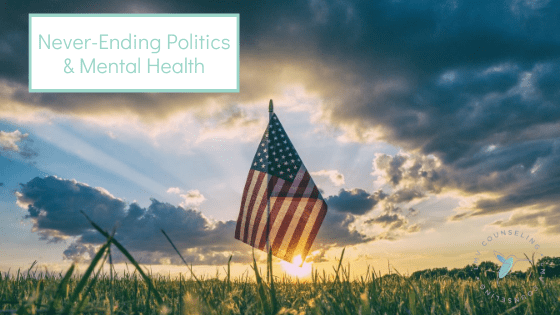Protect Your Mental Health from Tense Political Stress 
Election year in America can become a tense time for family and friends. Politics become a topic of conversation and opinions are shared widely on social media. The 2016 presidential election was a tough for many. The race between Clinton and Trump brought about divisive rhetoric and unprecedented conflict. Since that time, the past four years have be fraught with events that have tested each American’s mental health.
Once again we are in an election year. This year the landscape is similar, however the heat in the pressure cooker is turned up. The COVID-19 pandemic and racial injustice has led to increased stress and concern. The constant onslaught of news is harmful to your mental health. In social circles, sensitive subjects of systematic racism and healthcare systems are being discussed. It is no longer acceptable to not have an opinion on the current events.
It’s no wonder Americans are reporting high levels of anxiety and stress. It is necessary, perhaps now more than ever, to take active steps to address and care for your mental health. We have provided steps to help you cope with the toll the stressful political climate.
Know the Media’s Purpose
The free press is a founding principle of this nation. It is embedded in our constitution and is seen largely as a cornerstone of freedom. Journalist must provide information and uncover stories. They seek to inform and entertain. They have the  ability to choose and shape what the general public pays attention to. The press determines what is published and what stories are killed. Some news outlets are focused more intensely on celebrities and some more on politics.
ability to choose and shape what the general public pays attention to. The press determines what is published and what stories are killed. Some news outlets are focused more intensely on celebrities and some more on politics.
It was clear and easy to tell the difference between these two when media was largely print. It was clear that the National Enquirer featured more outlandish stories and other outlets published credible stories. However, the internet has created a confusing landscape and it is difficult to critically think about the source that the news is coming from. In fact, many people were not taught how to critically think to evaluate the source of their news.
Stay Informed from Accurate Sources
The dissolution of the ability to critical evaluate where information has originated coupled with the discrediting of news sources by politicians, has led to the increase in fake news. All news is not fake news. There are some sources that follow strong journalistic principles of fact checking. However, there are many that do not.
Social Media as a News Source
Many Americans cite social media as a source for news or current events. Social media is not a credible news source. Information on social media has been used to spread misinformation and spread messages that are based in extreme  viewpoints. Social media plays a bigger role in bringing people to fake news sites than credible news sites. Facebook was cited as a large player in spreading fake news stories during the 2016 election. We cannot trust media giants to take over the role of critical thinking and discerning what is and is not true.
viewpoints. Social media plays a bigger role in bringing people to fake news sites than credible news sites. Facebook was cited as a large player in spreading fake news stories during the 2016 election. We cannot trust media giants to take over the role of critical thinking and discerning what is and is not true.
When you see news on Facebook ask yourself is this a credible news source? How do I know this to be true?
Influencers
Influencers on Instagram have been identified as powerful tools to help shape opinions of the viewers. Companies has welded this power by heavily investing their marketing dollars toward this trend. Often these influencers, or opinion leadership, will share information they believe to be true to millions of viewers. These individuals are often not experts in their field and unknowingly contribute to false information being shared.
When viewing influencers or following accounts, ask yourself is this person an expert in this field? Do they have reason to have increased knowledge about this subject?
Comments and Trolls
There is nothing worse than a troll to get your blood boiling! People often leave extreme comments meant to increase the anger and frustration in the reader. It is a form of cyberbullying and is a way to incite a reaction. It does just that for many who read comments on a political post or article.
Skip reading the comment thread on articles and opinion posts. It will increase your frustration is it does not align with your belief system.
 Set Boundaries
Set Boundaries
Boundaries let people know what is and is not okay with you. You are worthy of setting boundaries and you get to do this whenever you want! The key to setting boundaries, especially with politics is practice, practice, practice. Welcome dissonance but not disrespect.
It’s possible that you are open to discussing politics and enjoy a lively debate. This could be your time to shine! Even when welcoming a conversation, you can set the boundary that you welcome dissonance but respect must be displayed.
Respectful behavior during a debate includes:
- Allowing one person to finish talking before speaking
- Keeping your voice at a conversational level
- Respecting one another’s space- for Americans that’s typically at least 4 feet
- Making eye contact and refrain from eye rolling
- Ending the conversation if either party says that they no longer want to discuss it
- Refrain from using curse words or insults to shame the other person’s character
Who? When? How?
It is not always an appropriate time to engage in a heated discussion about politics. The time and setting of the debate should be considered. Arguing via social media is not an appropriate place for a debate. Again I repeat- social media is not an appropriate place for a debate. Additionally, arguing after ingesting alcohol or other drugs is not productive. Substances lower inhibitions which could lead to an increased risk of disrespectful behavior being displayed. It is also recommended to refrain from having intense debates right before going to bed. Conflict, even when done so respectfully, increase cortisol levels which interfere with sleep.
Avoiding Arguments About Politics
Conflict can be helpful and can lead to people learning more from one another. Arguments often lead to each party digging in their heels and becoming more stubborn about there position. Try the following to avoid arguments and refocus the conversation:
“I would rather not discuss this any further.”
“Let’s agree to table this for a little while until we can both calm down.”
“I’m not in the mood to talk about this right now. I’ll let you know when I’m feeling up to it.”
Recognize Your Own Self-Talk
We can really ramp up our own fear and anxiety with our internal self-talk. Have you ever caught yourself saying,
“This country is falling apart.”
“(insert politic official) is an idiot.”
“I cannot believe how crazy these people are. The country didn’t used to be like this.”
These statements contain inflammatory language that will evoke a fight or flight response. Tame your own thinking by recognizing the extreme nature of the language you are using with yourself and others. Reframe the way you are speaking to yourself about current events. Try to avoid labeling (i.e. idiot, asshole) and void all or nothing thinking. It is more  beneficial to craft a statement that is helpful, effective, and realistic to express your thoughts. For example, the thought “This country is changing in ways that I am unfamiliar with.” or “(insert public official) seems to have trouble making decisions that are in the best interest of the general public.” Both maybe accurate statements and both are less extreme.
beneficial to craft a statement that is helpful, effective, and realistic to express your thoughts. For example, the thought “This country is changing in ways that I am unfamiliar with.” or “(insert public official) seems to have trouble making decisions that are in the best interest of the general public.” Both maybe accurate statements and both are less extreme.
Nothing is easy about politics. We must make some difficult choices politically and to remain mentally healthy. Regardless of your beliefs, opinions, and affiliation get out there and vote. Don’t just consume information. Turn it into action and effect change.
You are not alone in your struggles with mental health due to the political climate. This is a challenging time and for some if maybe easier to navigate than others. If you or a loved one needs some additional support, reach out and get started now.
Keep reading:

